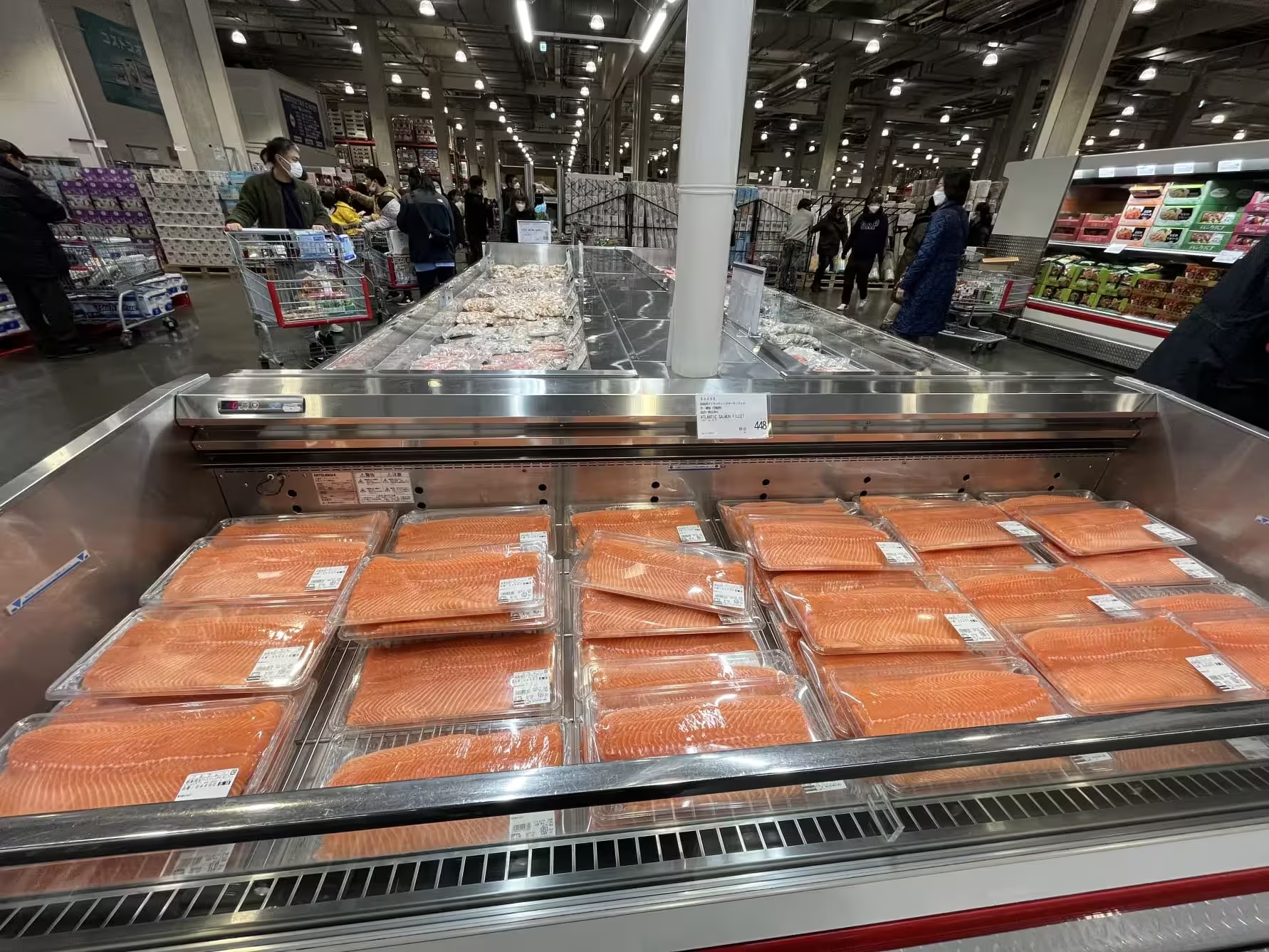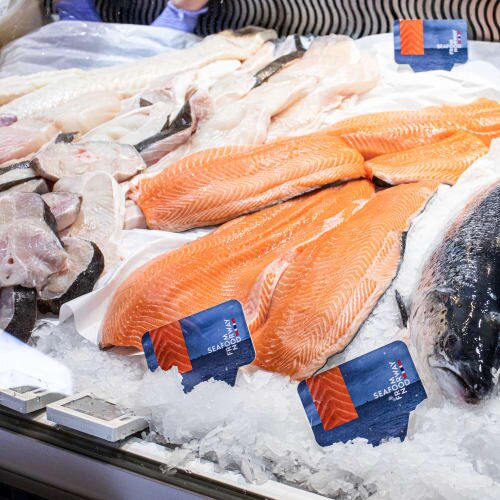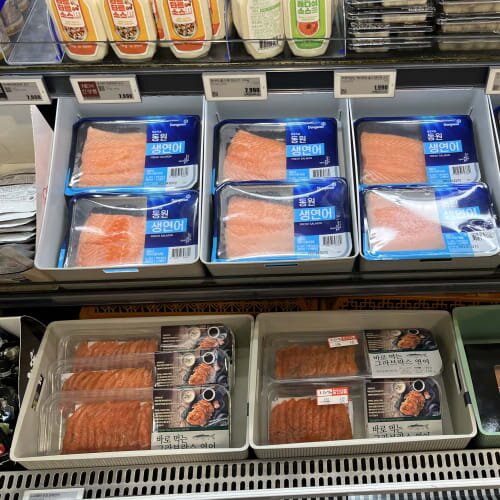Norway exported NOK 18.4 billion worth of seafood in October. This is an increase of NOK 3.3 billion, or 22 per cent, compared to the same month last year.
Never has Norway exported a higher value of seafood in a single month than in October. The last top quotation from a single month originates from March this year. The export value then ended at NOK 15.7 billion.
Best single month ever
“The growth in value for salmon continues, contributing greatly to October being the best single month ever for Norwegian seafood exports. The combination of high salmon prices, increased export volume and the weak Norwegian krone, lifted the total value to a historically high level”, says the CEO of the Norwegian Seafood Council, Christian Chramer.
In October, Norway exported salmon worth NOK 12.5 billion. It accounted for 68 per cent of the total value of seafood exports last month, which is a growth of 22 per cent compared to October last year.
The export value of salmon has passed NOK 100 billion in 2023
“So far this year, the export value of salmon has increased by 18 per cent, measured in Norwegian kroner, and in October, the value passed NOK 100 billion for the year. However, much of the increase in value can be attributed to a weaker Norwegian krone. Measured in euros, the export value of salmon has only increased by 4 per cent so far this year”, explains Chramer.
So far this year, Norway has exported NOK 142.4 billion worth of seafood. In comparison, Norway exported seafood worth NOK 151.4 billion in 2022, which was a new record.
Three factors driving export value
“2023 has so far been characterised by high food inflation, increased costs and a strong currency effect. These factors have helped push up the value measured in Norwegian kroner. The result is that seafood exports this year will be at a record high”, says Christian Cramer.
In line with expensive times and reduced purchasing power, over time, there has been a decline in the import and consumption of seafood in many of the large European seafood markets.
“The decline in inflation in recent months, as well as prospects for somewhat improved economic development, however, gives hope that demand will improve in Europe going forward”, says Christian Chramer.
Facts about seafood exports in October
- The largest markets for Norwegian seafood exports in October were Poland, Denmark and the USA.
- Poland had the largest increase in value this month, with an increase in export value of NOK 740 million, or 41 per cent, compared to the same month last year.
- The export volume to Poland ended at 37,283 tonnes, which is 18 per cent higher than the same month last year.
- Seafood was exported to a total of 116 countries in October.
- Of the wild-caught species, it was herring and mackerel that had the greatest increase in value in October.
Strong value growth for salmon
- Norway exported 138,530 tonnes of salmon worth NOK 12.5 billion in October
- The value increased by NOK 2.3 billion, or 22 per cent, compared to October last year
- There is a growth in volume of 6 per cent
- Poland, France and Denmark were the biggest markets for salmon in October
Poland had the largest increase in value this month, with an increase in export value of NOK 660 million, or 41 per cent, compared to the same month last year. The export volume to Poland ended at 27,462 tonnes, which is 18 per cent higher than the same month last year.
Increased processing in the lead-up to the Christmas sale
“The reason is that processing, especially for smoked salmon, increases in the run-up to the Christmas sales. Even though the price measured in euros is above last year's level”, says Paul T. Aandahl, Seafood Analyst with the Norwegian Seafood Council.
Italy was the third largest growth market for salmon in October, after Poland and Denmark. Growth was as much as 50 per cent, to NOK 2.3 billion.
Strong demand in Italy
“Even though the coronavirus pandemic, increased inflation and high price growth have contributed to significantly higher living costs, Norwegian salmon has done well in the Italian market”, says Tom-Jørgen Gangsø, the Norwegian Seafood Council's envoy to Italy.
He points to the weak Norwegian krone as an explanation, but also the relatively strong demand for Norwegian salmon in Italy.
“Salmon has a large shelf space in the grocery store compared to other seafood. In addition, there has been a large increase in the number of restaurants with salmon on the menu in recent years. We see that, among other things, in the increase in pokè restaurants”, explains Gangsø.
Trout increased in value
- Norway exported 6,305 tonnes of trout worth NOK 570 million in October
- The value increased by NOK 118 million, or 26 per cent, compared to October last year
- There is a growth in export volume of 28 per cent
- The USA, Ukraine and Thailand were the biggest markets for trout in October.
Belarus had the largest increase in value this month, with an export value of NOK 37 million, compared to nothing last year. The export volume ended at 439 tonnes.
Fall in value for fresh cod
- Norway exported 1,870 tonnes of fresh cod to a value of NOK 118 million in October.
- The value fell by NOK 11 million, or 9 per cent, compared to October last year.
- Export volume fell by 9 per cent.
- Denmark, Spain and the Netherlands were the biggest markets for fresh cod in October.
The export volume of farmed cod continues to increase, and as much as 44 per cent of the export value of fresh cod in October was farmed cod.
In total, 890 tonnes of fresh whole-farmed cod were exported in October, to a value of NOK 52 million. This is more than a doubling in both value and volume compared to October last year.
Wild-caught cod is affected by various factors
“The export of wild-caught fresh cod is falling in line with lower quotas and landings, says Eivind Hestvik Brækkan, Seafood Analyst with the Norwegian Seafood Council.
While Spain was the largest destination country for farmed cod in October, with an export volume of over 300 tonnes, over 80 per cent of the wild-caught cod ended up in the transit country Denmark.
Increased exports to Spain
“The Spanish love fresh Norwegian cod and are our biggest cod market. It is gratifying that the export of fresh cod to Spain also continues outside the flounder season”, says the Norwegian Seafood Council's envoy to Spain, Tore Holvik.
The export volume of wild-caught fresh cod ended at 980 tonnes, worth NOK 66 million. This is a decrease of 42 per cent in volume and 38 per cent in value.
Fall in volume and value for frozen cod
- Norway exported 4,349 tonnes of frozen cod worth NOK 246 million in October.
- The value fell by NOK 27 million, or 10 per cent, compared to October last year.
- Export volume fell by 7 per cent.
- China, Poland and the UK were the biggest markets for frozen cod in October.
Although China was the largest destination country for frozen cod in October, the volume there continues to decline, as it has done all year.
A total of 1,375 tonnes of frozen cod were exported to China in October, which is 16 per cent lower than in the same month last year.
Lowest share to China in 15 years
“So far this year, only 17 per cent of frozen cod exports have gone to China. We have to go back to 2008 to find a lower market share”, says Eivind Hestvik Brækkan, Seafood Analyst with the Norwegian Seafood Council.
The proportion of frozen cod exported to Europe has increased significantly this year, from 56 to 71 per cent.
“Increased geopolitical risk has given greater attention to global value chains also in the seafood industry. That may be part of explaining this development”, says Brækkan.
Good month for clipfish
- Norway exported 11,204 tonnes of clipfish to a value of NOK 886 million in October.
- The value increased by NOK 178 million, or 25 per cent, compared to October last year.
- There is a growth in volume of 19 per cent.
- Portugal, Brazil and Congo-Brazzaville were the biggest markets for rockfish in October
4,700 tonnes of cod clipfish were exported in October, to a value of NOK 571 million. This is an increase of 19 per cent in volume and 33 per cent in value compared to October last year.
Brazil was the biggest market for saithe clipfish
For saithe clipfish, the export volume was 5,600 tonnes, to a value of NOK 256 million, an increase of 23 per cent in volume and 17 per cent in value. In addition, clipfish of tusk and long fish were exported for NOK 32 and NOK 23 million, respectively, in October.
“Brazil was the largest market measured in value, closely followed by Congo-Brazzaville, with an export value of NOK 75 and 72 million, respectively”, says Eivind Hestvik Brækkan, Seafood Analyst with the Norwegian Seafood Council.
Decline to Portugal so far this year
As usual, Portugal was the largest market for cod clipfish, capturing 76 per cent of the export value and an increase in export volume of 15 per cent in October.
So far this year, the export volume of clipfish to Portugal is 6 per cent lower than last year.
Portuguese authorities slash VAT
“In April, the authorities in Portugal reduced VAT on several essential foodstuffs, including cuttlefish. This has resulted in lower retail prices in stores and increased sales volume. The VAT reduction will positively contribute to the consumption of clipfish now leading up to Christmas. When this scheme is scheduled to end at New Year, it could impact consumption”, says the Norwegian Seafood Council's envoy to Portugal, Trond Rismo.
Growth for saltfish
- Norway exported 2,186 tonnes of salted fish to a value of NOK 153 million in October.
- Export value increased by NOK 45 million, or 42 per cent, compared to October last year.
- There is a growth in volume of 33 per cent.
- Portugal, Italy and Canada were the biggest markets for salted fish in October.
Portugal had the largest increase in value this month, with an increase in export value of NOK 41 million, or 69 per cent, compared to the same month last year.
The export volume to Portugal ended at 1,153 tonnes, which is 40 per cent higher than the same month last year.
Unchanged value for dried fish
- Norway exported 521 tonnes of dried fish to a value of NOK 135 million in October.
- Export value is unchanged compared to October last year.
- Export volume fell by 4 per cent.
- Italy, Croatia and the USA were the biggest markets for dried fish in October.
Croatia had the greatest increase in value in October, with an export value of NOK 7 million, or 46 per cent, compared to the same month last year.
The export volume to Croatia ended at 69 tonnes, which is 26 per cent higher than the same month last year.
“The export volume to our largest dried fish market, Italy, fell by 60 tonnes in October to 270. So far this year, however, the volume to Italy has increased by 83 tonnes, or 4 per cent, to 1,617 tonnes”, says Eivind Hestvik Brækkan, Seafood Analyst with the Norwegian Seafood Council.
Positive value development for herring
- Norway exported 23,314 tonnes of herring worth NOK 430 million in October
- Export value increased by NOK 22 million, or 5 per cent, compared to October last year.
- Export volume fell by 20 per cent.
- Poland, Lithuania and Germany were the biggest markets for herring in October.
The important NVG catching season started in early October. The first few weeks were quiet, but from the middle of the month, there was good fishing, with 36,200 tonnes in week 42 and 47,200 tonnes in week 43.
Turning from whole frozen herring to fillet
The reduction in export volume is due to a shift from whole frozen herring to fillets.
“Last year, 11,000 tonnes of frozen whole NVG herring were exported in October, while exports fell to 2,600 this year. The price of frozen whole NVG herring is around 20 per cent higher than last year, and only Egypt keeps up with these prices”, says Jan Eirik Johnsen, Manager of Pelagic Species with the Norwegian Seafood Council.
So far this year, 61,500 tonnes of frozen whole herring have been exported, compared to 94,000 tonnes at the same time last year. This is a decrease of 35 per cent.
“There is still good demand for herring fillets, especially in Lithuania, Poland and Germany”, explains Johnsen.
In October, 14,400 tonnes of fillet were exported, compared to 11,300 tonnes in the same month last year, an increase of 27 per cent. This is happening even though the prices for herring fillets increased by 18 per cent on average from October last year to October this year.
“Lower herring quotas this year compared to last year and an even lower quota for NVG herring next year, together with a weak krone, contribute to a high level of export prices”, says Jan Eirik Johnsen.
Growth in volume and value for mackerel
- Norway exported 79,172 tonnes of mackerel to a value of NOK 1.8 billion in October.
- The value increased by NOK 357 million, or 25 per cent, compared to October last year.
- There is a growth in volume of 4 per cent.
- Japan, South Korea and China were the biggest markets for mackerel in October.
Good volume and a record-high average price for mackerel resulted in a record-high export value in a single month.
The average price in October this year was NOK 22.50, compared to NOK 18.70 in October last year, an increase of 20 per cent. At the same time, the price that the industry pays to the fleet has increased by 28 per cent so far this year.
Fishing takes off in British waters
“After poor fishing in the Norwegian zone in September, fishing picked up when the Norwegian boats started fishing in the British zone in October. The agreement with Great Britain in June this year enabled Norwegian fishermen to fish 135,000 tonnes in British waters. Of this, only 400 tonnes now remain. For the fleet, there are now approx. 35,000 tonnes in the Norwegian zone”, says Jan Eirik Johnsen, Manager of Pelagic Species with the Norwegian Seafood Council.
Increased direct exports to Japan
The trend of increased direct exports to Japan and increased exports for processing in Vietnam instead of China continues.
“So far this year, 55,000 tonnes have been exported to Japan, compared to 45,000 tonnes last year, an increase of 22 per cent. So far this year, 21,000 tonnes have gone to China, compared to 50,000 tonnes at the same time last year, a decrease of 58 per cent”, says Johnsen.
Strong export month for king crab
- Norway exported 235 tonnes of king crab worth NOK 125 million in October
- Export value increased by NOK 47 million, or 61 per cent, compared to October last year
- There is a growth in volume of 113 per cent
- The USA, Vietnam and Hong Kong SAR were the biggest markets for king crab in October.
“Despite the increased supply of Russian king crab in Asia and the reopening of fishing for red king crab in Alaska, October was a strong export month for Norwegian king crab”, says Josefine Voraa, Manager for Shellfish with the Norwegian Seafood Council.
Exports of king crab to the US continue to grow following sanctions against Russian crab. In October, 153 tonnes with a value of NOK 88 million were exported, a record in both volume and value for a single month for king crab to the USA.
This is an increase of NOK 50 million, or 134 per cent, compared to October last year.
“The average price for frozen and live king crab is falling, so the increase in value is primarily driven by increased volumes and a weakened Norwegian krone”, Voraa explains.
The total increase in volume to the USA is 212 per cent. For frozen king crab, the volume has tripled compared to October last year.
Fall in exports of live king crab to Asia
“As there is now a lot of Russian king crab in the Asian markets, the export of live king crab to Asia is falling compared to the last few months. This is no surprise. Nevertheless, 41 tonnes of live king crab, worth NOK 13 million, were exported in October to Asia, with Vietnam and Hong Kong as the largest markets”, says Josefine Voraa.
This is an increase of 277 per cent in volume to Asia compared to October last year, but here, the price fell by as much as 16 per cent, from NOK 393 per kg to NOK 330 per kg.
Heavy fall for snow crab
- Norway exported 34 tonnes of snow crab worth NOK 3 million in October.
- The value fell by NOK 30 million, or 90 per cent, compared to October last year.
- The volume fell by 85 per cent.
- Bulgaria, the USA and the Netherlands were the biggest markets for snow crab in October.
Bulgaria had the largest increase in value this month, with an export value of NOK 2 million, compared to nothing last year. The export volume ended at 26 tonnes.
Strong month for prawn
- Norway exported 1,928 tonnes of prawn worth NOK 118 million in October
- Export value increased by NOK 13 million, or 12 per cent, compared to October last year
- There is a growth in volume of 32 per cent
- Great Britain, Sweden and the Netherlands were the biggest prawn markets in October.
The Netherlands had the largest increase in value in October, with an export value of NOK 8 million, or 121 per cent, compared to the same month last year.
Good development for the Netherlands
“The main reason is that in October this year, 201 tonnes of frozen, cooked shell prawn went to the Netherlands, compared to nothing last year. The export volume to the Netherlands ended at 270 tonnes, which is 274 per cent higher than the same month last year”, says Josefine Voraa, Manager for Shellfish with the Norwegian Seafood Council.
Frozen boiled shell prawn is the product with the greatest increase in value compared to the same month last year, with an increase of NOK 14 million. NOK 24 million worth of frozen cooked shell prawn was exported in October. 142 tonnes of this ended up in Ukraine, which has been a major growth market for prawn in recent months.
Strong month for frozen peeled prawn to the UK
“The UK is the largest prawn market in October, and this month is the strongest for frozen peeled prawn so far this year. The value has increased by NOK 796,000, or 11 per cent, from a relatively strong October last year”, says Voraa.
Frozen peeled prawn are still the largest product by value. In October, 874 tonnes of frozen peeled prawn were exported to a value of NOK 76 million, which is on par with last year.




